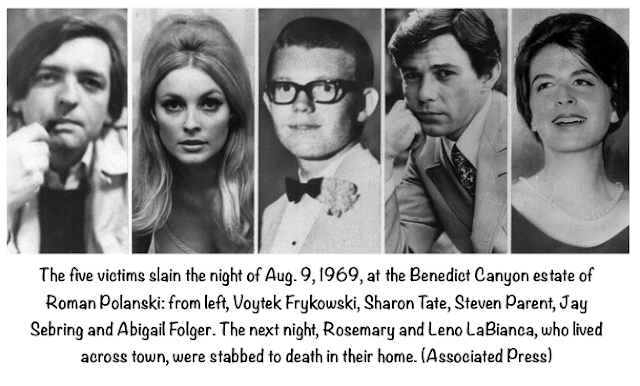On This Date In History
On August 9, 1969, members of Charles Manson’s cult kill five people in movie director Roman Polanski’s Beverly Hills, California, home, including Polanski’s pregnant wife, actress Sharon Tate. Less than two days later, the group killed again, murdering supermarket executive Leno LaBianca and his wife Rosemary in their home. The savage crimes shocked the nation and turned Charles Manson into a criminal icon.
Manson was born in Cincinnati, Ohio, in 1934 to an unwed 16-year-old mother. He spent much of his childhood in juvenile reformatories and his early adulthood in prison. After his release in 1967, Manson moved to California and used his unlikely magnetism to attract a group of hippies and set up a commune, where drugs and orgies were common, on the outskirts of Los Angeles.
Manson preached his own blend of eccentric religious teachings to his acolytes, who called themselves his “Family.” He told them a race war between blacks and whites was imminent and would result in great power for the Family. Manson said they should instigate the war by killing rich white people and trying to make it look like the work of blacks.
Roman Polanski (Rosemary’s Baby, Chinatown, The Pianist), was not the cult leader’s intended target. Manson, an aspiring musician, chose the Polanski house because he had once unsuccessfully tried to get a recording deal from a producer who used to live there. Polanski was out of town at the time of the murders, but his wife and her friends, including coffee heiress Abigail Folger, were shot or stabbed to death. Manson stayed out of the Polanski house on the night of the crime and didn’t take part in the LaBianca killings either. However, he would later be charged with murder on the grounds he had influenced his followers and masterminded the crimes.
After initially eluding police suspicion, Manson was arrested only after one of his followers, already in jail on a different charge, started bragging about what had happened. Manson’s subsequent trial became a national spectacle, in which he exhibited bizarre and violent behavior. In 1971, he was convicted and given the death penalty; however, that sentence became life behind bars when the California Supreme Court overturned the death penalty in 1972.
Manson has been the subject of numerous movies and books, including the best-seller Helter Skelter (the title is a reference to a Beatles’ song of the same name, through which Manson believed the group was sending secret messages to start a race war). Manson died in prison in 2017.
On August 9, 1945, a second atom bomb is dropped on Japan by the United States, at Nagasaki, resulting finally in Japan’s unconditional surrender.
The devastation wrought at Hiroshima was not sufficient to convince the Japanese War Council to accept the Potsdam Conference’s demand for unconditional surrender. The United States had already planned to drop their second atom bomb, nicknamed “Fat Man,” on August 11 in the event of such recalcitrance, but bad weather expected for that day pushed the date up to August 9th. So at 1:56 a.m., a specially adapted B-29 bomber, called “Bockscar,” after its usual commander, Frederick Bock, took off from Tinian Island under the command of Maj. Charles W. Sweeney.
Nagasaki was a shipbuilding center, the very industry intended for destruction. The bomb was dropped at 11:02 a.m., 1,650 feet above the city. The explosion unleashed the equivalent force of 22,000 tons of TNT. The hills that surrounded the city did a better job of containing the destructive force, but the number killed is estimated at anywhere between 60,000 and 80,000 (exact figures are impossible, the blast having obliterated bodies and disintegrated records).
General Leslie R. Groves, the man responsible for organizing the Manhattan Project, which solved the problem of producing and delivering the nuclear explosion, estimated that another atom bomb would be ready to use against Japan by August 17 or 18, but it was not necessary. Even though the War Council still remained divided (“It is far too early to say that the war is lost,” opined the Minister of War), Emperor Hirohito, by request of two War Council members eager to end the war, met with the Council and declared that “continuing the war can only result in the annihilation of the Japanese people…” The Emperor of Japan gave his permission for unconditional surrender.










No comments:
Post a Comment